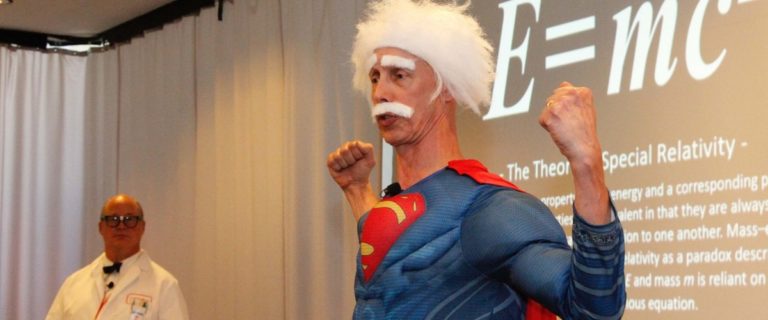Heard the one about the engineer sentenced to death by guillotine? He watches the device malfunction, quickly studies it, then calls out, “Hold on, I see the problem!”
At Xerox, we like to think of ourselves as Business Engineers: People who solve business problems by applying an engineer’s approach.
That got us thinking about the Engineer’s Mindset – what makes engineers different from the rest of us?
Curiosity
The doomed protagonist in the joke was demonstrating an almost pathological curiosity: the engine that drives the engineer.
Many of us suppress our natural curiosity in the interest of getting on with a productive day – we can’t afford to stop all the time to wonder about things. Engineers indulge their curiosity, nurture it, and hone it with precision.
Curiosity also drives their passion to make things better. The engineers we know are truly passionate people who, in their own way, seek elegant solutions.
As author/engineer Dan Bricklin said, “There is beauty in something that actually enhances someone’s life.” Business engineers pursue this beauty. It’s their calling. Finding that perfect balance of people, processes, and technology is why they come to work.
What does that future look like?
Learn what Xerox researchers and engineers are doing with computers, printed electronics, and immersive experiences that blend the physical and digital worlds.*
Teamwork
Accustomed to working in teams, engineers are naturally collaborative. They may have a strong vision of their own, but they know how to consider input from others. Teamwork stirs the pot and it fuels optimism. Business engineers have a natural conviction that “it can be done and we can do it.”
Pattern-Finding
One way they do it is through acute abilities in pattern recognition. All humans naturally recognize patterns – it’s the way we all learn. But business engineers perceive patterns differently and perhaps more deeply. They have a certain kind of playfulness in toying with alternatives in the way things work. “Engineers,” said Bricklin, “love to take components and put them together to make a greater whole.”
Status Quo Skepticism
Companies get in trouble by locking themselves into legacy processes that have evolved slowly (often for reasons no one can remember). Any consultant coming in the door can see this. Blogger Mike Shipulski cites “a healthy disrespect for the status quo” as being a key component of the engineer’s mindset.
Good business engineers don’t let the status quo deter them from thinking outside the box, even if they end up with solutions that include aspects that are very much in the box. The main thing is, it has to work better.
Fresh Perspective
Often, an innovative solution includes an element of reorientation – taking common assumptions a little out of context and re-examining them. Jazz musician Thelonius Monk turned the round clock on his kitchen wall to position the 11 at the top instead of the 12. To anyone who knows his music, this makes complete sense. (But it drove his wife crazy.)
Creating something that people instantly accept is not the goal of business engineers. Their goal is to create something simple and effective that works so well, it often becomes invisible. Early critics scorned Monk’s music, until they came to understand and respect it. And his wife came to expect the 11 to be at the top of the clock.
Drawing a comparison between musicians and innovative business engineers is not really so far-fetched. Today, MIT and other technology schools encourage engineering students to take classes in things like songwriting and poetry. Who knows how those non-linear pursuits may one day contribute to brilliant engineering solutions?
Subscribe to this blog and receive email updates when we publish a new article.
Learning from Failure
Of course, skills in hard analytics are primary for any engineer. They analyze exhaustively before designing a new solution – and after it’s put into practice.
This is particularly true after failure. When an aircraft experiences a serious malfunction, the engineers at the National Transportation Safety Board swarm over it, analyze it, simulate it, understand it, and ultimately fix it. They know that a failure is an opportunity to prevent future failures. “No one wants to learn from mistakes,” said engineer Henry Petroski, “but we cannot learn enough from successes to go beyond the state of the art.”
Business engineers are not averse to failure: It only makes them more curious. For most of us ”back to the drawing board” is uttered with a demoralized droop – for business engineers the same phrase is uttered with a kind of delight.
Communicators
Another characteristic of the best business engineers is that they tend to be excellent communicators. Unlike many classically trained engineers, it isn’t enough for them to scribble a formula and speak in cryptic jargon to other specialists. They have to be able to make themselves understood both within the team and to cliental stakeholders. The old saw that ”engineers who don’t communicate well end up working for engineers who do” does not apply here. They all communicate well.
Innovators
Lastly, the business engineer has a clear grasp of the competitive necessity of innovation. The imperative to improve has driven our species from its infancy. It drove the Neanderthals. It also drove the Apollo 13 engineers on the ground in Houston, who had to devise a makeshift contraption that scrubbed excess carbon dioxide from the air of the stricken Command Module. The success of that solution gave the Apollo 13 crew the fighting chance to make it home against all odds. While most business necessities are more earthbound, they are, in a sense, no less important.
The optimist thinks the glass is half full while the pessimist thinks the glass is half empty. The pure engineer thinks the glass is too large by a factor of two.
The business engineer may think the extra capacity of the glass builds in flexibility that could be key in orchestrating a harmonious balance of people, processes, and technology. That balance, always the goal of great business engineers, makes a beautiful tone when struck.
*Updated on November 7, 2017.




We think differently from others…
I’m an engineer myself. Thus I could not agree more… 🙂
Another to add to the list, savvy evaluators. At Roberts Communications, we’ve learned that modern engineers always employ a research based approach to solving the most complex challenges. I find it interesting to see how their go-to media preferences for research have evolved based on the available tchnology and age/experience groups. Easily accessible how-to videos, on-demand webinars, digital trade media and social media are now attracting and empowering egineers to work more efficiently under tighter time constraints. Furthermore, the field of engineering has expanded over the past few decades to now include dozens of market segments within the handful of primary core fields (industrial, energy, aerospace, etc.) Within these segments are a pretty diverse group; mechanical, design, civil engineers and more. Engineers are often lumped together due to a lack of understanding relative to the diversity of the field and as a whole seem worthy of greater understanding and attention from employers and marketers.
[…] L’article original a été initialement publié sur le blog Simplify Work […]
I agree as well. Engineering is a mindset not a profession. Some people love technology, some are not interested.
[…] just dedication and passion to the craft, the engineering mindset is also a hallmark of those who are successful at problem solving of all […]